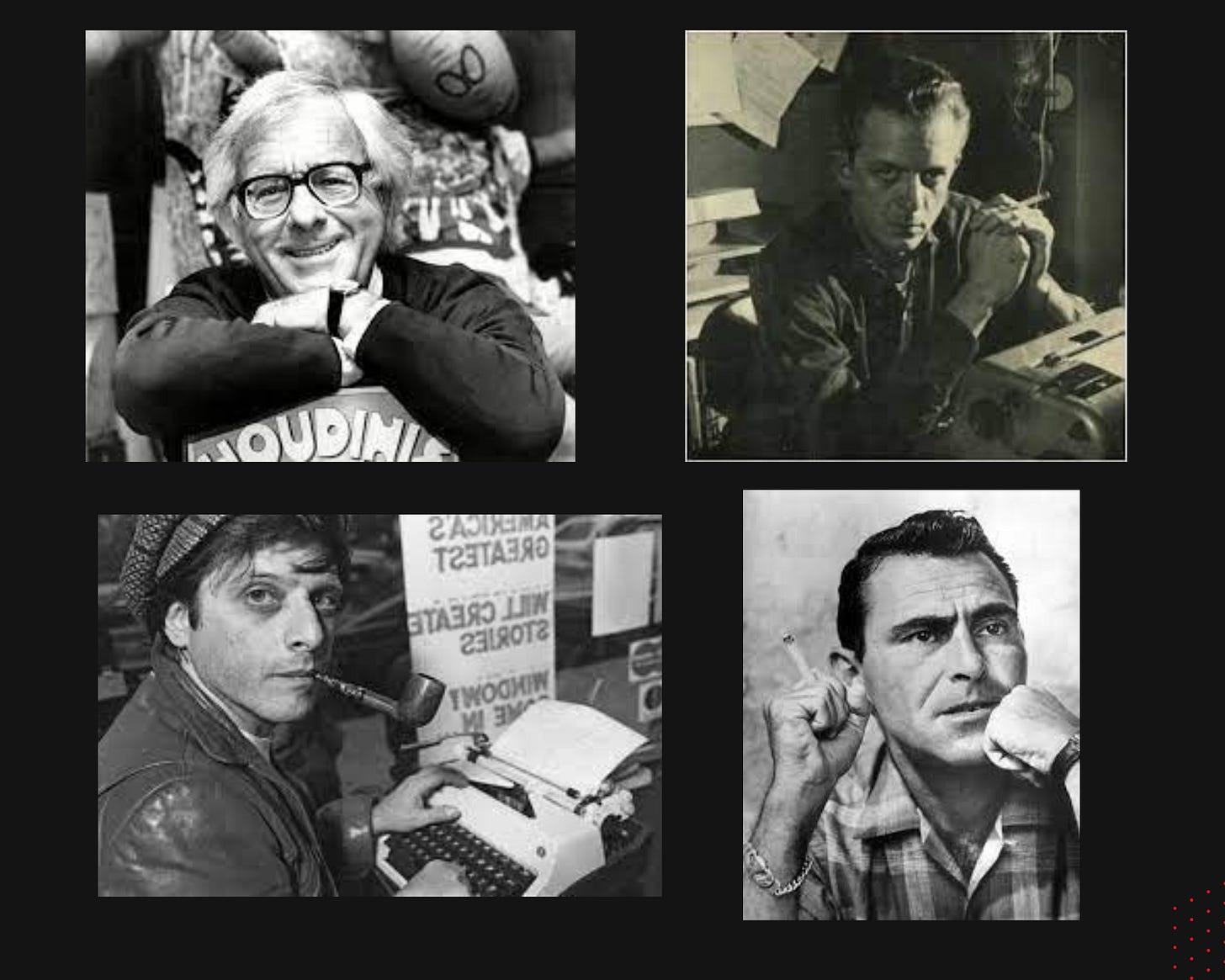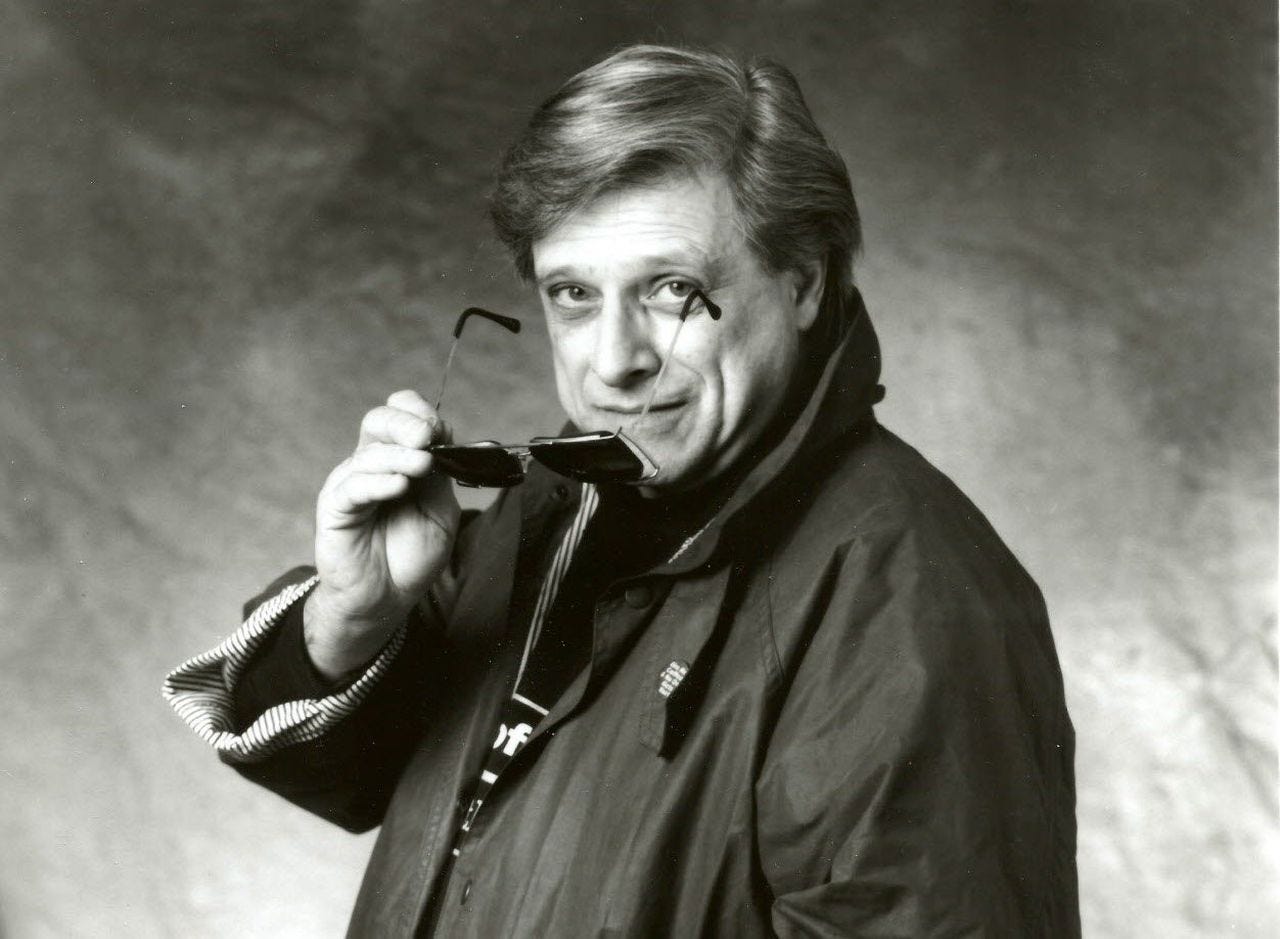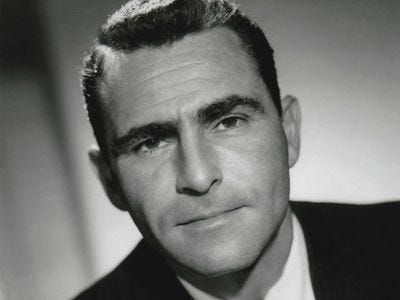The following writers have played important roles, not just when it comes to my fiction, but also who I am as a person. My imagination often feels like popcorn kernels sitting in a pot waiting to explode. With a little bit of oil and set to high heat new ideas, worlds, characters, and thrills begin to pop up and suddenly I am away, gone from this world into my own. Sometimes it can be overwhelming, but I wouldn’t have it any other way.
This is my small tribute to four giants of fiction and fantasy. This is how I can say thank you.
Ray Bradbury
The Sage of Fiction. It only made sense to mention Bradbury first, since he was the man who not only influenced the rest of the writers on this list but opened my mind to new ideas and stories.
The rabbit hole begins with Bradbury.
I took a science fiction seminar during my Freshman year of college and was lucky enough to read short stories and novels by esteemed writers such as Isaac Asimov, and Octavia Butler, and even watch movies like Soylent Green and Terry Gilliam’s Brazil. I’m ashamed to admit my habit of reading for pleasure did not begin until I reached this point in my life, and I owe it all to Bradbury’s short story, Mars is Heaven, a wonderful tale of American astronauts landing on Mars only to find the distant, dusty, desert world to be…a little too familiar.
The Science Fiction Writers of America believed it to be one of the best science fiction short stories. For me, it was a gateway drug not only to Mr. Bradbury but to the gut-punch power that is the short story form. When I found myself deep in the pit of my depression for a three month dry spell of not writing new words this past summer, Bradbury’s lectures at UCLA saved me. The words he spoke to students in 1964 and 1968, pulled me out of that hell of a pit and brought me back to the writing chair. Listen to his lectures below. If you’re not bursting with excitement and joy, rushing to write by the end, then you may have bigger problems on your hands.
Charles Beaumont
Mr. Charles Beaumont is next on my list for two reasons. The first reason being he is without a doubt, my favorite writer. Hunting down his work in used bookstores, eBay, and thrift shops has become sport for me. I consider myself lucky to be in possession of three volumes of his short fiction, including The Howling Man collection, edited by Roger Anker, and The Carnival and Other Stories published by Subterranean Press.
My second reason is that I find it criminal for such a talented writer as Beaumont to be almost forgotten. His stories of speculative fiction and horror are wonderful and make for great studying of how to write tightly told stories with a punchy ending. Not only was his fiction featured in top paying markets such as Playboy Magazine, but he was also one of the more prolific writers for the original Twilight Zone series being first introduced to the show’s creator, Rod Serling, by Ray Bradbury himself.
Sadly, Beaumont passed away at the young age of thirty-eight leaving behind his family and many unpublished works. He will continue to be a wonderful influence for me as I continue to practice and grow as a writer.
Harlan Ellison
Ah, Uncle Harlan. Known by many for his bombastic personality, unrelenting commentary on the rise of human stupidity, and decline of cultural literacy, Harlan Ellison was not to be trifled with. Outside of all that, of course, was his grand body of work: thousands of short stories, essays, TV/film scripts, comic books, columns, and articles that earned his reputation (and notoriety) for being insanely prolific.
Winner of eight Hugos and four Nebulas Awards, Ellison penned some of the most imaginative stories from I Have No Mouth And I Must Scream, Shatterday, Paladin of the Lost Hour, A Boy and His Dog, Jefty is Five (my personal favorite), and many, many more. With such a strong voice and unique style of storytelling, I’m always entertained, if not dazzled by his work, especially his audio narration. Lately, I’ve been on the hunt for his audio vérité, The Voice From the Edge: three volumes of stories and commentaries read by the author himself. Ellison, being a child of the golden age of radio, channels that love for spoken word beautifully in his recordings and received several awards for it.
The Executor of his estate, legendary writer J. Michael Straczynski, has been hard at work preserving Ellison’s great oeuvre through the Harlan and Susan Ellison Foundation and keeps fans updated regularly through his Facebook page.
Though the great literary fantasist is gone, I will continue to enjoy (and discover) more and more of his work.
Rod Serling
Last but certainly not the least is Mr. Rod Serling. Those who know Serling, know him best for The Twilight Zone, arguably the greatest TV show for speculative, science fiction, and fantasy. Premiering in October 1959, Rod Serling took over television sets and introduced American audiences to another dimension of sound, sight, and mind that entertained AND delivered a deep, sincere message of moral lessons. In fact, Serling only used the genre tropes and conventions of Science Fiction, Fantasy, and Horror as a way to bypass the strict censorship he experienced from the networks.
Though he wrote 92 of 156 episodes, Serling employed many great writers such as Charles Beaumont, Richard Matheson, Earl Hamner Jr., George Clayton Johnson, and others. When I’m not rewatching the original episodes, chances are you’ll find me in my study listening to the Twilight Zone Radio Show as my imagination travels to the fifth dimension.
Bradbury’s love of short fiction, Beaumont’s mastery of craft, Ellison’s visionary work, and Serling’s Twilight Zone have all made a tremendous impact on me as a writer and creative. Their methods of using genre fiction to convey powerful commentary on the challenges of their time inspire me to pick up my pen and do the same with my own fiction.
In fact, my recently published book of short stories does exactly this.
Grind is a collection of short tales written in the tradition of Serling’s Twilight Zone, mixed with imaginative narratives of speculative science fiction and unsettling terror through a new genre of Corp Dread. These stories will leave you questioning the cost of surrendering oneself to the relentless demands of the corporate world.
This book is a combination of my love of the short story and the influences of the men I mentioned above. If it were not for their respective works, I would not be the writer I am today. It is the first of many collections to come in my career. Now available in ebook and paperback.
Final Thoughts
I think it’s important for any artist to stay connected with his or her influences For Bradbury, it was John Collier and Edgar Rice Burroughs. For Ellison, it was Gerald Kersh and Kafka. The work of a writer has the power not only to influence readers but also to pave the way for the next generation of artists. The Partners at the Pulp, Pipe, & Poetry offices are always sharing newly acquired books from the masters that came before us. We have a deep respect and admiration for the many men and women who laid the foundation for genre fiction, many of whom we will pay tribute to in future magazine installments.
If you find yourself struggling to write creatively like I was this past summer, take a break and revisit your favorite artists. Find their work, devour it, consume it, enjoy it, study it, rip it apart until you’re numb in the face. It has proven for me to be a wonderful exercise in restarting and rejuvenating my creativity. Perhaps it will help you too.
To Mr. Bradbury, Mr. Beaumont, Mr. Ellison, and Mr. Serling:
Thank you and cheers, gentlemen.










Excellent taste, my friend. These men shaped my story sensibilities as well. Important to note none of these dudes:
1. Wrote to market
2. Used beta readers
3. Revised stories hundreds of times
As a kid I read most of Bradbury, and Ellison's books were harder to find, but I read most of him as well. This is back in the 1970s!
I don't think I ever heard of Beaumont.
This calls for further investigation ...